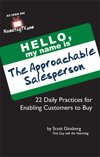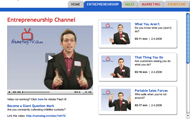 Hugh Macleod said it best:
Hugh Macleod said it best:
“People can say a lot about Americans: We’re idiots, uncultured, shallow and naïve. But what we do have that almost no other country has, is a pretty good monopoly on possibility.”
That what I love about this country: We’re all free to live our dreams.
Notice I didn’t say “The American Dream.”
That phrase is done. As George Carlin so aptly observed: “It’s called The American Dream because you have to be asleep to believe it.”
What matters is your dream. Your vision. Your possibility.
THE CHALLENGE IS: Having a dream is easy – selling that dream is the nightmare.
Fortunately, if you execute a few key practices, I promise that you won’t wake up in the middle of the night in a cold sweat:1. Go back to the future. When I first started my publishing company, my mentor asked me a question I’ll never forget: “If everybody did exactly what you said, what would the world look like?” Turns out, this is the critical question that every writer – and, for that matter, every leader – needs to ask. Here’s why:
First, it enables you to act as if the dream has already come true. Second, it helps you imagine what you need to become in order for the dream to manifest. Third, it empowers you to speak from the future, then look back to identify the steps that led there. Finally, it inspires you to paint a compelling, detailed picture of the desired future that you can meaningful strides toward.
And the best part is: This question keeps you accountable to your dream as you sell it. Because all you have to do is make sure that what you’re doing every day is both giving people the tools they need to build that world, plus showing them how to use those tools correctly.
Remember: You can’t sell anyone on your dream if you haven’t sold it to yourself first. If everybody did exactly what you said, what would the world look like?
2. Enable the infection. Not with a fatal disease, of course. The word “infect” comes from the Latin inficere, which means, “to put in.” That’s what approachable leaders do: They infect their followers. And the question you have to ask yourself is: What are you putting into people?
Fire? Passion? Creativity? Excitement? Inspiration? Enthusiasm? Salmonella? What are you infecting them with?
In fact, it might not even matter. With the exception of most diseases, what you infect people isn’t as important as how you infect them. And in my experience, the best way to infect people is simple: Go out of your way to gush. Just like you do with your best friend after a memorable first date.
You know the drill: You call them up as soon as you get back to your car. Then, while your heart is still doing back flips, you yap their ears off for an hour about how great the girl is.
That’s gushing. Letting the infection cascade out of your pores like a waterfall until other people have no choice but to believe you. It has nothing to do with being sick. It’s about transferring emotion. Putting something into people. Influencing them with your energy, mood, mindset and overall state of being. Whom are you infecting?
3. Connect your dreams to their values. Enrolling your loved ones into your dream is not a tent revival moment of conversion – it’s a continual process of constitutional alignment. That’s the next secret to selling your dream: Helping people understand that your dream directly connects to three things.
First, with the person they are. Second, with the narrative they hold. And third, with the vision they maintain. Without that trifecta, when faced with the opportunity to buy into your dream, people will yawn, offer their best golf clap and mutter, “Meh, that’s nice.”
The thing is: You don’t want to be nice – you want to be necessary. Here’s the difference. Nice gets commended; necessary gets compensated. Nice leads to sticky; necessary leads to spreadable. Nice achieves mindshare; necessary captures heartshare. Nice is a helpful addition; necessary is a vital component. And nice is the vitamin that convinces you you’re getting better; while necessary is the aspirin that actually kills your pain.
Get the point? See the pattern? Align your dream with their reality. Otherwise, if people can’t see their own reflection in the finish of your wood, they’ll never buy your furniture. How are you create a message to resonate with what’s already there?
4. Inspire people to see the world as you do. In her book, The Story Factor, Annette Simmons reminds us that people don’t want more information – they want faith in you, your goals, your success and the story you tell. “That’s why people pick up where you left off: Because they believe.”
The hard part is getting them to drink the punch. For example, I recently launched brandtag, my series of customized, limited edition art pieces. It’s by far the riskiest thing I’ve ever shipped. But what most people don’t know about this project, however, is that it took fifteen months to execute. And not because I was procrastinating.
Rather, because I was documenting every single phase of the creative process – then, privately sharing it in a twenty-minute slide show presentation – with people who matter to me. Partly to obtain their feedback, but also to infect them with my vision of what the world would look like when these art pieces finally shipped.
And to my delight, when brandtag set sail, those people were already on board and willing to help me paddle.
Remember: If people can’t see the passion in your face, they won’t hear a word that comes out of your mouth. Will you do whatever it takes to get your dream into the hearts of the people who matter most?
5. Convince people that you’re doing something important. It’s not enough to help people dream the same dream as you – you also have to educate them on why they should sell it for you. The secret, writes Guy Kawasaki in Selling the Dream, is to enable as many people as possible to touch, feel and experience your cause. Literally.
If you have to physically run a live demo in public, do it. If you have to build a prototype that paints a detailed picture of the dream’s desired future, do it. And if you have to hire a camera crew to follow you around for a week so you can produce a sixty-second promo video to publish on your social platform, do it.
That’s how you go beyond radical honesty and enter into the territory of ridiculous transparency: By being gloriously explicit. By punching people in the face with your dream and making no qualms about how the world will be a better place once it comes to fruition. How are you making it easy for people to go with your flow?
6. Err on the side of embodiment. Jesus didn’t just tell stories – he was the story. That’s what enabled his dream to endure. That’s what made his dream eminently sellable to the masses. And that’s what inspired his followers to leap out of their sandals and paint the earth with his dream for the next two thousand years.
The cool part is: You don’t need to be a Christian to be a follower of Christ. We can all learn from his example, religious beliefs notwithstanding. My suggestion: Stop being a storyteller and start being a storyliver.
The proof is already there. All you have to do is figure out what questions you’ve been answering with your life since your dream started. Then, write them down. Next, support each question with at least three specific stories and experiences from your life. And finally, use that reservoir of embodiment as ammo to mount an evidence campaign. How much evidence will you need to take the people who matter lightyears beyond reasonable doubt?
REMEMBER: Selling your dream can be disheartening.
Especially when people don’t take you seriously, aren’t interested in your progress and only seem to notice the negativity of your endeavors.
But.
Everything depends on those who go on anyway.
Be one of those persisters. Seek your dream – not thee dream.
Resisting you will be futile.
LET ME ASK YA THIS…
Would you rather follow your heart and fall on your face, or swallow your voice and watch freedom escape?
LET ME SUGGEST THIS…
For the list called, “153 Quotations to Inspire Your Success,” send an email to me, and you win the list for free!
* * * *
Scott Ginsberg
That Guy with the Nametag
Author, Speaker, Entrepreneur, Mentor
[email protected]
 Never the same speech twice.
Never the same speech twice.
Now booking for 2011-2012!
Watch The Nametag Guy in action here!
 Sick of selling?
Sick of selling?


 Approachability is about increasing the probability.
Approachability is about increasing the probability. My business card is a nametag.
My business card is a nametag. 
 Oscar Wilde was right.
Oscar Wilde was right. Following your heart is more than just doing what you want.
Following your heart is more than just doing what you want. I’m tired of people telling me that there are no limits.
I’m tired of people telling me that there are no limits. You’re not in the job market – you’re in opportunity market.
You’re not in the job market – you’re in opportunity market. If size mattered, dinosaurs would still be around.
If size mattered, dinosaurs would still be around.